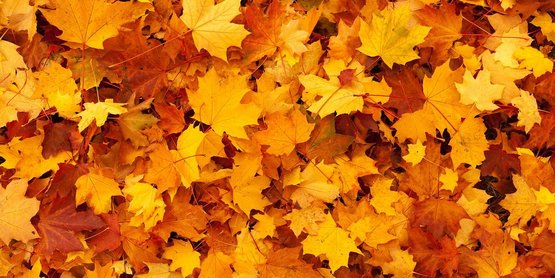Where do insects and other invertebrates go in the winter? The vast majority “overwinter,” or spend winter, right where they spent all summer — just less active and more hidden.

Think twice before you rake, mow, and blow this year. Invertebrates rely on fallen leaves and other organic debris to cover and insulate them from the elements. Whatever your landscape, you can ensure that resources for nests and overwintering habitat are available.
If you’ve provided native and diverse habitat for invertebrates and pollinators during the growing season, helping those invertebrates in the winter is almost as simple as doing nothing. Leave those habitats alone for winter.
Leaving the leaves and other plant debris doesn’t have to mean sacrificing your yard to the wilderness. The leaves don’t need to be left exactly where they fall. You can rake them into garden beds, around tree bases, or into other designated areas. Too many leaves can kill grass, but in soil they can suppress weeds, retain moisture, and boost nutrition.
Avoid shredding leaves with a mower. Raking or blowing (electric) are alternatives that will keep leaves whole for the best cover and protect the insects and eggs already living there.
Your garden’s wild residents benefit immensely when you practice good neighbor relations, leaving things a little messy and wild. After all, when you think of what these animals need, it is best to visualize the natural areas where they have evolved. Natural areas are not manicured, sticks and leaves are not “cleaned up” and removed, grasses grow long, seed heads are left for songbirds to feed on, and seeds can fall where they might germinate.
Of course, this can be a hard pill to swallow! It may be habitual, a matter of social conditioning, or a holdover of outdated gardening practices from yesteryear—but for whatever reason, we just can’t seem to stop ourselves from wanting to tidy up the garden at the end of the season. Changing that starts with knowledge.
So let your friends, neighbors, and social media circle know that they can also just #LeaveTheLeaves! Your yard is playing an important role in the ecosystem all year round, and it’s easy to find a compromise between a functional space for you and one that provides for wildlife. By simply doing fewer chores in the fall (and say, enjoying a steaming cup of spiced cider instead, courtesy of pollinators), your garden will reap the rewards of abundant pollination, natural pest control, and food for visiting birds and wildlife next spring.
If you decide you need to clean up the leaves and debris in spring, make sure you wait until late in the season so as not to destroy all the life you’ve worked to protect.
For additional information, check out https://xerces.org/leave-the-leaves and https://homegrownnationalpark.org/the-american-lawn-is-over/